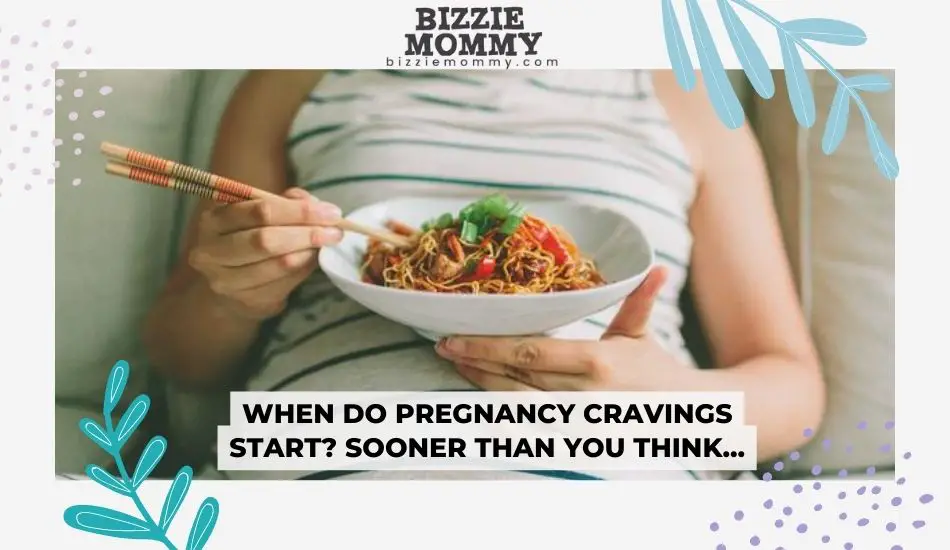Food cravings and aversions are a normal part of being pregnant. However, many new moms wonder about when pregnancy cravings start and whether they are normal or not. Know that they are totally normal for most women, and they begin as early as the first trimester.
Pregnancy cravings are a need to eat specific foods, which are brought on by hormonal changes. Cravings caused by pregnancy can feel like an almost insatiable want to eat certain foods. The cravings themselves might be for anything, from healthy foods like fruits and vegetables to strange combinations of junk food. Even though cravings are a cerebral yearning for particular foods, they can be so intense that a pregnant woman’s body perceives them as a physical necessity.
Throughout pregnancy, an increase in hunger is quite natural. From the beginning, hormonal changes can cause you to feel very hungry at any moment.
Are pregnancy Cravings Normal?
Food cravings during pregnancy are totally normal. Cravings happen because of hormonal changes in the body and are experienced by most pregnant women. You could have specific food cravings or get very hungry at any time throughout your day.
When Do They Start?
Your pregnancy journey might not be similar to that of other expectant mothers since every woman is different, but usually, cravings start during early pregnancy. After reaching their peak in the first and second trimesters, cravings tend to diminish during the start of the third trimester. Food cravings have been reported by some pregnant women as early as week five. They frequently occur at the same time as women may start to develop food aversion.
Common Kinds of Pregnancy Cravings
Particularly in the first trimester, hormonal shifts, discomfort, and sudden drops in blood sugar can make you go for certain foods. The following types of food are reportedly some of the most popular and commonly craved foods during pregnancy, albeit there is not much research to assist in identifying them.
Sweets
Whether a person is pregnant or not, research has revealed that sweets are among the most commonly craved foods all across the United States. Many pregnant women have reported craving chocolate and dark chocolate during early pregnancy.
While it’s acceptable to give in to your desires for sweets while you’re pregnant, it’s advised that you limit them as part of a balanced diet. Increased consumption of sugary snacks has been linked in research to a higher risk of gestational diabetes, whereas extreme weight gain in pregnancy could be harmful to both you and the baby.
Fast Food
A crispy, salty dish of chips or a cheesy pizza may sound particularly appealing at times during pregnancy. Pizza and chips have been found to be two of the most common pregnancy cravings. Similar like to sweets, it’s acceptable to occasionally give in to these desires, but aim to eat them as a component of a healthy, steady diet. You may alternatively choose a more nutritious option, such as handmade french fries or a pizza topped with vegetables that are high in fiber and vitamins.
Fruit
It’s perfect if you crave fruit when pregnant because this is a satisfying and healthy snack you can consume both during and after pregnancy. Making a wonderful fruit smoothie or grabbing fresh fruit will help you satisfy a fruit appetite.
Carbohydrates
High carbohydrate cravings during pregnancy, such as those for crackers, pasta, and bread are normal too. Instead of choosing processed kinds that can have extra sugar, fats, or salt, choose healthy alternatives that contain more nutrients, like fiber and vitamins if you catch yourself craving them. Fiber has the added benefit of keeping you full while assisting in the prevention of constipation, which is highly prevalent in the second trimester.
Dairy
Pregnancy also frequently results in dairy cravings. The good thing is that this craving is typically healthy as well. Dairy products like milk, yogurt, and cheese all include calcium, a nutrient that supports the development of strong bones and teeth in the fetus, as well as the maintenance of your own skeleton.
According to ACOG’s general recommendations, pregnant women around 19 years old and older should eat 1,000 mg of calcium daily, while those under the age of 18 should take 1,300 mg. Just make sure to choose dairy products prepared from pasteurized milk and stay away from cheeses and other items that contain unpasteurized milk. These goods could include Listeria bacteria, which could cause a dangerous infection.
Spicy Food
You may be having a pregnant food craving if you suddenly feel like eating very spicy meals, like Mexican food. Spicy appetites are very common during pregnancy. It’s okay to give in to this temptation, but you may want to avoid spicy foods if you have heartburn or other stomach problems frequent during pregnancy because there is evidence that spicy foods may make them worse.
Cold Foods
This is also one of the early pregnancy cravings. Ice cream or popsicle cravings during pregnancy are quite frequent. It’s permissible to give in to this urge, just like with sweets, but strive to do so as a component of a balanced diet. You might also consider a healthier alternative to ice creams, such as homemade fruit smoothies or frozen yogurt.
Some Weird Pregnancy Cravings
You can be suffering from pica if you experience cravings for inedible things like ash, dirt, soap, or chalk that contain little to no nutritive value.
You might feel the urge to eat relatively harmless things, like ice, as a result of this illness. However, occasionally, you could find yourself drawn to non-food items like ash, paint, or dirt.
Some speculate that cravings and your body’s attempt to absorb vitamins or minerals because of certain nutritional deficiencies may be related. If you think you may be experiencing pica, you should consult a doctor right away because it can have serious repercussions, including lead poisoning. Some weird pregnancy cravings are:
Ice
Ice is yet another common craving you could experience when pregnant, but it may also be a sign that you have pica. This one, in contrast to the others, is reasonably risk-free. But be mindful of the potential harm eating ice or ice chips can do to your teeth.
Ice cravings are frequently associated with anemia. An iron deficiency can cause your tongue to expand, and ice can reduce any inflammation while also hydrating you.
Chalk
Despite the fact that it might not appear normal, craving chalk is a prevalent symptom of pregnancy and can be an indication of pica. Women have acknowledged purchasing chalk to satisfy their hunger. Even though chalk is usually not poisonous, resisting this temptation is definitely best for both you and your kid.
Dirt
Some believe there is a connection between the love for dirt and anemia. Even while it’s been proven that dirt and clay can work as filters to block harmful toxins and viruses and prevent morning sickness, they can also bring dangerous bacteria into your body.
Think about eating a leafy green meal to increase your consumption of iron and vitamins and perhaps satisfy your appetite.
Ash
Another typical but rare need is ash from cigarettes. You must prevent this for understandable reasons. It’s critical to try to replace it with fruit and to let your doctor know if you do.
What Are Food Aversions?

You may have observed that just thinking about your favorite food makes you want to puke. Or perhaps, you find that certain foods with strong smells bother you. Contrary to food cravings, food aversions might cause you to avoid particular foods or beverages.
The human chorionic gonadotropin hormone, which causes a positive pregnancy test, grows quickly during early pregnancy and reaches its peak at roughly ten weeks of pregnancy. One of the most common reasons for food aversions when pregnant is nausea which is related to this rise in HCG during the first few weeks. Hormonal balance, shielding the unborn child from noxious chemicals, and/or nutritional inadequacies are a few possible explanations. This is done to promote healthy eating and growth during pregnancy.
Alcohol and caffeine are two common food aversions, but both should be avoided during pregnancy to preserve the health of your unborn child. Additionally, some women have a food aversion to foods that are oily, fatty, or have strong aromas. The majority of dietary cravings and aversions won’t hurt you or your unborn child. You may, however, be missing out on vital nutrients in your diet if you discover that your diet has been restricted due to extensive food aversions.
Is There a Link Between Cravings and Baby Gender?
Stories of being able to predict the gender of your unborn child by paying close attention to pregnancy cravings have been passed over the centuries. You could be expecting a girl if you want sweet things like milk, chocolate, juice, and dairy.
Consider a boy if you crave salty meals like pizza and potato chips all the time. There hasn’t been any trustworthy scientific evidence regarding a possible connection between food cravings with gender prediction despite the fact that a few studies have been performed to survey women about the cravings they had and their opinions about what it signifies.
What Can I Do About Them?
It’s crucial to exercise moderation when giving in to your pregnancy cravings as with anything else. These food cravings, especially junk food, might lead to weight gain during pregnancy.
Pregnant women should be aware that they need to consume a specific number of calories each day to maintain their health. Avoid giving in to urges, especially if they include unhealthy foods. While cravings during pregnancy can become natural and unavoidable due to hormonal changes, use these strategies to manage and maintain your health:
- Keep a healthy diet with a focus on calorie control and how much weight you gain throughout each trimester. This is the most effective approach to lessen pregnancy cravings.
- Try to satisfy food cravings with lower-calorie foods. For instance, if you’re craving a cheeseburger from a fast food joint, consider cooking one at home with lean beef and reduced-fat cheese.
- Separate dinners. When you’re starving and also have low blood sugar, pregnancy cravings frequently seem to be at their strongest. Instead of eating three larger meals a day, try and eat six fulfilling smaller meals instead.
Food Cravings in Pregnant Women Are Normal
Pregnancy food cravings are very normal. Additionally, if you don’t have any food cravings at all and they don’t correspond to abnormally high levels of pregnancy weight gain, maternal glycemia, or child outcome assessments, you shouldn’t be concerned.
When food cravings do occur during pregnancy, they often begin in the first trimester, which can be as early as five weeks. After that, they might grow worse in the second trimester before gradually decreasing in the third. The most common pregnancy cravings are probably for sweets, carbs, fast food, fruits, dairy, spicy foods, and cold meals, though there is no clear science to back this up. Indulging in these pregnancy cravings within a nutritious, well-balanced diet is often permissible unless told otherwise by a doctor.

